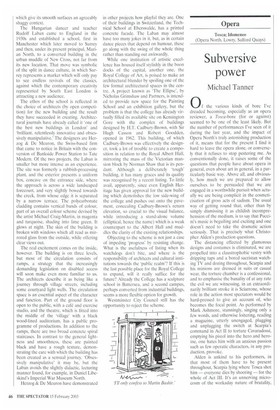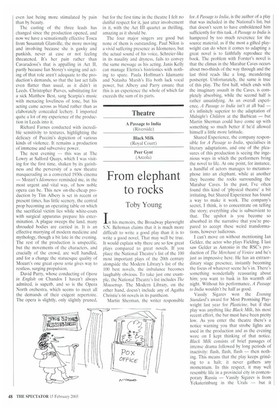Tosca; Idomeneo (Opera North, Lowry. Salford Quays)
Subversive power
Michael Tanner
f the various kinds of bore I've dreaded becoming, especially as an opera reviewer, a Tosca-bore (for or against) seemed to be one of the least likely. But the number of performances I've seen of it during the last year, and the impact of Opera North's truly astonishing production of it, means that for the present I find it hard to leave the opera alone, or conversely that it refuses to stop pestering me. As conventionally done, it raises some of the questions that people have about opera in general, even about art in general, in a particularly basic way. Above all, and obviously, how much we are prepared to allow ourselves to be persuaded that we are engaged in a worthwhile pursuit when actually we are being complicit in the cosmeticisation of gross acts of sadism. The usual way of getting round that, other than by simply dismissing it as childish incomprehension of the medium, is to say that Puccini's music is beguiling and exciting and one doesn't need to take the dramatic action seriously. That is precisely what Christopher Alden's production questions.
The distancing effected by glamorous designs and costumes is eliminated, we are propelled into a claustrophobic vestry with dripping taps and a bored sacristan watching TV and dozing throughout, Scarpia and his minions are dressed in suits or casual wear, the torture chamber is a confessional, and to emphasise the banality of at any rate the evil we are witnessing, in an extraordinarily brilliant stroke it is Sciarrone, whose role in the action most spectators would be hard-pressed to give an account of, who becomes the focal point. As performed by Mark Ashmore, stunningly, singing only a few words, and otherwise loitering, reading a magazine, utterly unengaged, plugging and unplugging the switch at Scarpia's command in Act II to torture Cavaradossi, emptying his pistol into the hero and heroine, one hates him with an anxious passion such as few operatic characters, in any production, provoke.
Alden is unkind to his performers, in that most of them have to be present throughout. Scarpia lying where Tosca shot him — everyone dies by shooting — for the whole of Act III. It's an unnerving microcosm of the workaday nature of brutality, even lust being more stimulated by pain than by beauty.
The casting of the three leads has changed since the production opened, and now we have a sensationally effective Tosca from Susannah Glanville, the more moving and involving because she is gawky and punkish, never at ease or not feeling threatened. It's her pain rather than Cavaradossi's that is appalling in Act partly because Ian Storey's singing and acting of that role aren't adequate to the production's demands, so that the last act falls even flatter than usual, as it didn't in Leeds. Christopher Purves, substituting for a sick Matthew Best, sang Scarpia's music with menacing loveliness of tone, but his acting came across as bland rather than as elaborately concealed lechery. I imported quite a lot of my experience of the production in Leeds into it.
Richard Fames conducted with incredible sensitivity to textures, highlighting the delicacy of Puccini's depiction of various kinds of violence. It remains a production of immense and subversive power.
The next evening — this was at The Lowry at Salford Quays, which [was visiting for the first time, shaken by its garishness and the perversity of a new theatre masquerading as a converted 1930s cinema — Mozart's /domeneo reminded me, in the most urgent and vital way, of how noble opera can be. This new on-the-cheap production by Tim Albery is set in recent or present times, has little scenery, the central prop becoming an operating table on which the sacrificial victim lies while white-coats with surgical apparatus prepare his extermination. A plague sweeps the land, many shrouded bodies are carried in. It is an effective marrying of modern medicine and mythology, though a bit late in the evening. The rest of the production is unspecific, but the movements of the characters, and crucially of the crowd, are well handled, and for a change the statuesque quality of Mozart's one great opera seria gives way to restless, surging propulsion.
David Parry, whose conducting of Opera in English on Chandos I haven't always admired, is superb, and so is the Opera North orchestra, which seems to meet all the demands of their exigent repertoire. The opera is slightly, only slightly pruned, but for the first time in the theatre I felt no dutiful respect for it, just utter involvement in it, with the Act III quartet as thrilling, amazing as it should be.
The four major singers are good but none of them is outstanding. Paul Nilon is a vivid suffering presence as Idomeneo, but the actual sound of his voice, Schreier-like in its nasality and dryness, fails to convey the same message as his acting. Janis Kelly can manage Flettra's histrionics with nothing to spare. Paula Hoffman's ldamante and Natasha Marsh's Ilia both lack vocal power, but Albery and Parry ensure that this is an experience the whole of which far exceeds the sum of its parts.



































































 Previous page
Previous page